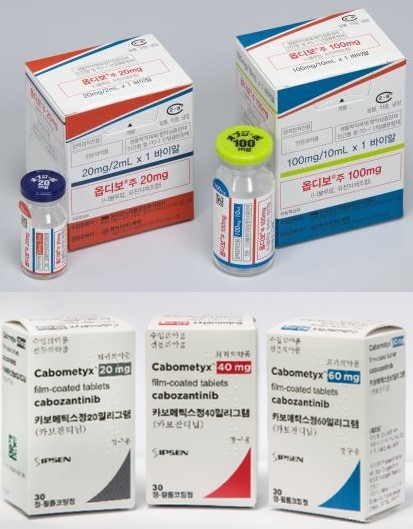The combination therapy of Opdivo (nivolumab), immunotherapy of BMS and Ono Pharmaceutical, and Ipsen’s targeted agent Cabometyx (cabozantinib) has demonstrated long-term efficacy in the primary treatment of progressive kidney cancer.

On Monday, BMS released the three-year follow-up data of its ChechMate 9ER study, a phase 3 clinical trial that directly compared the therapy with Sutene (sunitinib) on progressive kidney cancer not previously treated.
The data will be presented at the American Society of Clinical Oncology Genitourinary Cancers Symposium in 2023 (ASCO GU 23) from Feb. 16-18.
CheckMate 9ER study is a random, multinational clinical trial on 651 patients, where researchers divided them into 323 subjects administered with Opdivo-Cabometyx combo therapy and the Sutene group of 328 patients. The primary assessment variable was progression-free survival (PFS), and the secondary evaluation variables were overall survival (OS) and objective response rate (ORR).
As a result of the observation of three years (36.5-44 months), the combination therapy group’s median OS (mOS) was 32.9 months, improving by 11.8 months from previous data and reducing death risk by 30 months.
The median PFS (mPFS) for the combo therapy group was 16.6 months, nearly double that of the Sutene group’s 8.4 months. ORR was 57.7 percent vs. 28.4 percent, confirming benefits in twice as many patients in the combo therapy group as in the monotherapy group. The duration of response (DoR) was 23.1 months against 15.2 months, proving longer continuation. The complete remission (CR) rate was 12.4 percent for the combo group and 5.2 percent for the mono group.
The clinical trial results have provided an even firmer basis for the Opdivo-Cabometyx combination therapy as the option for the primary treatment of progressive kidney cancer.
Through the updated results of the CheckMate 9ER study, we could confirm the combination of nivolumab and cabozantinib could prolong patients’ lives and maintain responding advantages regardless of the patient’s risk classification, compared to sunitinib,” said Dr. Mauricio Burotto in charge of medical affairs at Bradford Hill.
The combination therapy of Opdivo + Cabometyx was recommended as the primary treatment of progressive kidney cancer by various global guidelines, including those of the U.S. National Comprehensive Cancer Network (NCCN), the European Society for Medical Oncology (ESMO), and the European Association of Urology (EAU). In February 2022, it also won approval for the primary treatment of progressive kidney cancer from the Ministry of Food and Drug Safety.
Concerning insurance coverage, Opdivo currently receives benefits only in combination therapy with Yervoy (ipilimumab), and Cabometyx gets benefits as monotherapy in patients with progressive kidney cancer of second phase or more and has treatment experiences with VEGF TKI (vascular endothelial growth factor tyrosine kinase inhibitor) under the risk-sharing system.
from Opdivo + Cabometyx combo therapy, two more therapies that combine immunotherapies and targeted agents have won approval in Korea. They are the combo therapy of MSD’s Keytruda (pembrolizumab) and Pfilzer’s Inlyta (axitinib), and Keytruda plus Eisai-MSD’s Lenvima (lenvatinib).

